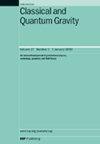Negligible MOND effects on the orbits of planets
IF 3.7
3区 物理与天体物理
Q2 ASTRONOMY & ASTROPHYSICS
引用次数: 0
Abstract
First proposed in 1983, modified newtonian dynamics (MOND) provides an alternative picture to dark matter theory. However, recently, there have been several reports that MOND is inconsistent with, or at least difficult to reconcile with, the orbits of planets in the Solar System. As with all the other studies so far, they assumed that the planetary accelerations can be computed without considering their own gravity (i.e. their self-gravity). Nonetheless, we demonstrate that, according to the original MOND theory, instead of its variants, each planet essentially follows a Newtonian orbit when its self-gravity is taken into account; the relative increase in gravitational acceleration due to MOND is at most 3 × 10−11 for Mercury, which has the highest relative increase among planets, while the value has a relative error of approximately 6 10−11, rendering the deviation from the Newtonian orbit undetectable with today’s technology. It is in stark contrast to the two major variants of MOND, namely AQUAL and MOND, where it has been proven that self-gravity can be ignored in a suitable limit when determining the MOND acceleration, which significantly deviates from the Newtonian acceleration. Consequently, attempting to constrain or falsify MOND through the analysis of planetary orbits becomes largely meaningless if the original MOND theory, rather than AQUAL or QUMOND, is valid. As a result, it is unjustified to argue that MOND is incorrect due to the observed lack of its influence on the orbits of planets, unless one of the variants of MOND theory, instead of the original one, is correct.MOND对行星轨道的影响可以忽略不计
修正牛顿动力学(MOND)于1983年首次提出,为暗物质理论提供了另一种图景。然而,最近有几份报告称,MOND与太阳系行星的轨道不一致,或者至少难以调和。与迄今为止的所有其他研究一样,他们假设行星加速度可以在不考虑其自身重力的情况下计算出来。尽管如此,我们证明,根据最初的MOND理论,而不是它的变体,当考虑到自身引力时,每个行星本质上都遵循牛顿轨道;对于水星来说,由于MOND导致的引力加速度的相对增加最多为3 × 10−11,是行星中相对增加最大的,而该值的相对误差约为6 10−11,使得与牛顿轨道的偏差用今天的技术无法检测到。这与MOND的两个主要变体,即AQUAL和MOND形成鲜明对比,在确定MOND加速度时,已经证明在适当的极限下可以忽略自重力,这明显偏离牛顿加速度。因此,如果原来的MOND理论是有效的,而不是AQUAL或QUMOND,那么试图通过行星轨道分析来约束或证伪MOND就变得毫无意义。因此,除非MOND理论的一个变体是正确的,而不是原来的那个,否则由于观测到它对行星轨道缺乏影响而认为它是不正确的是没有理由的。
本文章由计算机程序翻译,如有差异,请以英文原文为准。
求助全文
约1分钟内获得全文
求助全文
来源期刊

Classical and Quantum Gravity
物理-天文与天体物理
CiteScore
7.00
自引率
8.60%
发文量
301
审稿时长
2-4 weeks
期刊介绍:
Classical and Quantum Gravity is an established journal for physicists, mathematicians and cosmologists in the fields of gravitation and the theory of spacetime. The journal is now the acknowledged world leader in classical relativity and all areas of quantum gravity.
 求助内容:
求助内容: 应助结果提醒方式:
应助结果提醒方式:


